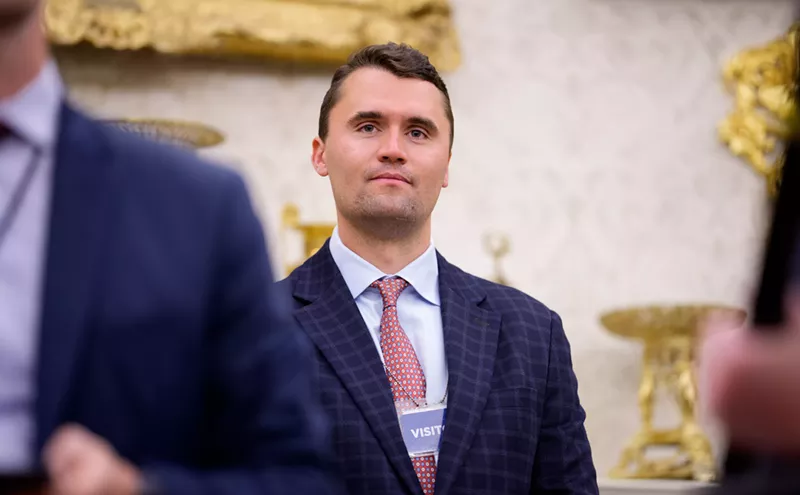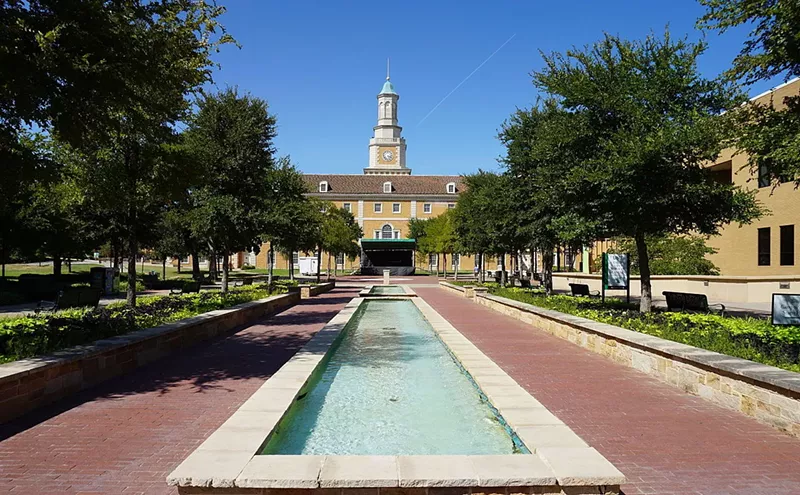Dallas Opera's Romeo & Juliet opens tonight at the Winspear. Staging the piece by Charles Gounod (sung in French with English supertitles) is Michael Kahn, the highly respected Shakespeare expert from the Shakespeare Theatre Company in Washington, D.C., where he's brought the works of the Bard to audiences for 25 seasons. A winner of six Helen Hayes directing awards, Kahn has a special affinity for Shakespeare's best romantic tragedy.
It was the first play he directed at Shakespeare Theatre a quarter century ago, and it's one he says still has relevance to modern audiences in its story of star-crossed teenage lovers from feuding families. One message in the play and opera, he says, is: "Parents don't always know what their kids are doing."
Between rehearsals at the Winspear, Kahn gabbed about Shakespeare, the missing elements he put back into the opera to make it all make sense and what he thinks of GOP attitudes toward eliminating funding for the arts. That interview -- along with two sneak peeks at the opera, filmed during dress rehearsal -- is after the jump.
How is staging Shakespeare as opera different from simply doing the play of Romeo & Juliet?
It's a play that I know very well. What I'm hoping I can bring to the Dallas Opera production and I think we have, is a sense of the life of the characters. Of the storyline very clearly. Of the youthfulness. The cast -- Lyubov Petrova as Juliet and tenor Charles Castronovo as Romeo -- is wonderful. I was concerned as to whether they'd be able to play young. And they're just wonderful at being youthful and vibrant, like everything's happening for the first time. It's more about the parents in the play -- I've added a Lady Capulet, who wasn't originally in the opera. That helps create the relationship between the nurse and Juliet. I've given the nurse quite a few things to do. And I've found places in the opera for the nurse to overhear or see or find out things. That brings the extraordinary sense of the life that the play has. I've also staged the prologue as a flashback. I'm having a very good time, to tell you the truth.
What gets lost or gained in hearing Shakespeare translated and sung in French?
I don't do opera that often. I've done about six. Both actors and singers who do Shakespeare have to have a very sure technique. Doing great soliloquies of Shakespeare, the language has its own rhythm, verse structure and tempo. It is analogous to singing. Sometimes some of the best classic actors have also been able to appear in musical theater because they can make words as important as lyrics.
I think so much is conveyed not just through music and lyrics but through your body. You need singers who can act with their body. And these singers [at Dallas Opera] can.
The play is more layered than the opera. More complicated. Deeper characterizations than in the opera. On the other hand, as gorgeous as Shakespeare is, and there's nothing in language that can compete, when music becomes ecstatic, you have larger moments and huge emotion in opera. I don't like stand-around opera. This is much too vibrant a piece.
The play is sort of a comedy for the first half -- the opera isn't. I think the first scene is sort of a romantic comedy. But the play moves from comedy to tragedy. Opera moves from romance to tragedy.
Romeo & Juliet is one of the most over-produced of Shakespeare's plays. Which of the plays do you think is under-produced? Or under-appreciated?
I have several of those. All's Well That Ends Well is a play that I love and that is not really liked before you see it. A lot of people avoid it because it's complicated. They don't understand how a smart young woman could go to all those lengths for what seems like a callow gentleman. I think it's about naiveté and growing up and what it's like to be from the country and go to Paris. The most recent production I did of it was in Washington. It's a play that I'm very fond of. Measure for Measure has been my good luck play. Still think it's a wonderful play. These two are sometimes called the runts of the litter.
My favorite is Henry IV. He creates in those two plays an entire world, an entire span of every kind of social divide: gender, father and son, age conflict, life, death, power. They encompass existence in an extraordinary way. Part 2 is like Chekhov in the end.
Romeo & Juliet, to me, has always been missed messages. If only the message from Romeo had gotten through, or the one from the Friar.
Unfortunately the whole scene about why the message doesn't get to Romeo is not in the opera -- that whole thing is left out of the opera. She takes the potion and then Romeo shows up. We don't really know what Friar Lawrence was planning. What I hope might come through is the fact that you don't always know what your kids are doing. And also that well-meaning good intentions don't always solve the problem.
What's your favorite line of Shakespeare?
When I've been rehearsing too long, it's "the rest is silence" from Hamlet. Or "fear not the heat of the sun" -- you can say them in different situations and just quote them.
After all those funerals at the end of Romeo & Juliet, do you think the Capulets and Montagues stayed friendly?
I hope so. If they don't learn something, history will repeat itself. There's no real justification for teenage suicide. If that's going to happen, if they don't learn something about what hatred does, then everybody's in trouble.
When I did the play of Romeo & Juliet, I remember having workshops for kids who were coming -- we had a counselor come in. Romeo's quite suicidal at the beginning of the play. We asked, if you were Benvolio [Romeo's buddy], would you tell someone if your friend was so depressed? In the play he doesn't. We talked about the fact that they should find some adult -- if not a parent, then teacher or counselor -- to see if they could get help. If you knew your friend had gotten married secretly, would you get help? That was important for me for young people seeing the play, to see they could get help. To find someone they could talk to. Not to take all the problems on yourself. That was one of the lessons of the play to teach the kids. Not that killing yourself is a way to solve your problems. This is how to use the play as a tool. There are other choices. Everybody gets unhappy. Everybody's heart gets broken. Those are things you cannot teach yourself. You need to talk it through and get help.
When I read the play, everything I learned about teen suicide was in the play: failure of parents, having a broken heart, peer pressure, the sense of inadequacy. It's all there.
Working in D.C., do you ever find yourself viewing contemporary world events or politics from a Shakespearean POV?
One of the perks of being in Washington is having your audience be part of the power structure of the country. People say, how come your plays seem so topical all the time? It's not a surprise that I do Richard III during an election year. Or do The Persians by Aeschylus during a war. Shakespeare deals so clearly with so many of the important issues. I'm finding quite often that someone calls me from a newspaper and asks if the president of the time is Henry V or Hal or Richard III. Does that character remind you of the vice president or secretary of defense? I don't do productions intending that someone like that is in the play, but Shakespeare always dealt with politics and power and fame.
When I did Timon of Athens, I set it in the 1980s to remind everybody that we did have the boom and the bust. We were in the boom of the 1990s. It would be smart to remember what happened in the '80s. And it happened again in the 2000s. It was a play that really spoke to the issue. You had the rich man who, when he lost his money, he lost his friends.
My job is to understand the play fully from Shakespeare's point of view but I'm directing it from the lens of a 21st century person. Those connections happen in the audience's minds all the time. In Romeo & Juliet, it's about teenagers.
What do you think about Congressional Republicans' recently stated goal to cut all government funding for the arts?
I think it comes out of ignorance of the importance of arts in every single person's life. The amount of money this country gives to the arts compared to other countries is quite frankly an embarrassment. On the simplest level, people see art. But people live with art. It's not just performing. If you look at a building, a sign, all of that design has been created by an artist. To cut a small amount of money from a national budget -- artists pay taxes, after all -- you are cutting a lot of jobs and you can't pretend that you care about jobs and cut arts funding. It's very shortsighted to think of that as a budget cut.
Dallas Opera's Romeo & Juliet will be performed February 11, 13 (matinee), 16, 19, 25 and 27 (matinee) at the Winspear Opera House at the ATT Performing Arts Center. For tickets, call 214-443-1000.












